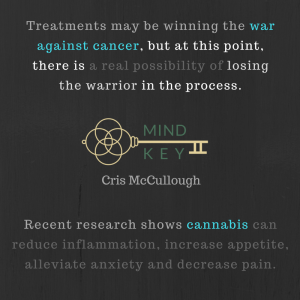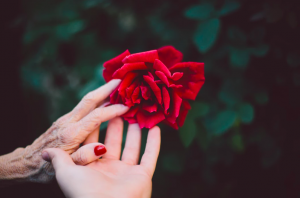
Healing with Compassion: A caregiver’s experience
Compassionate healthcare considers cannabis use for patients as a way to heal with dignity. Cris McCullough, MA, is a Holistic Counselor with a practice in Portsmouth, RI. This personal account tells of her first-hand experience with medical marijuana in Rhode Island as a caregiver of a cancer patient who was rapidly losing weight due to aggressive treatment.
By Cris McCullough, MA, Holistic Counselor
It was with some anticipation that we entered a new world together, my BFF of 60 years and myself. As we crossed the threshold of the Greenleaf Compassion Center, we didn’t exactly know what to expect.
I had known Marcia since college. She was the maid of honor at my wedding, and godmother to my daughter. We had been through a lot together over the years. This would prove to be the beginning of yet another adventure. In April of 2018, Marcia had been diagnosed with tonsil cancer. We can only assume that when her tonsils were removed as a teenager, something had been left behind. She had been through intense radiation and chemotherapy, and now just had to survive to wellness.
A foodie losing all taste for food
Marcia was a chef by profession and a dedicated foodie whose world revolved around creating and enjoying healthy, delicious meals. The diagnosis of cancer on her tonsil couldn’t be more devastating. Months of intense radiation and chemotherapy had systematically stripped her olfactory senses and taste buds. Swallowing was difficult as she developed lymphoma from the intense radiation. She said food tasted like “dirt” and that nothing was appealing.
In a matter of months, Marcia rapidly went from 135 to 90 lbs. Efforts to install a temporary feeding tube were scrapped when her bowels were accidentally perforated. She was subsisting on hydration therapy three times a week at the Cancer Center, and whatever we could get her to keep down—which wasn’t much. Soon her weight plummeted to 85 pounds!
As her health advocate, I was surprised that the Cancer Center’s staff of nutritionists and counselors were not more proactive in addressing her alarming weight loss. Counselors suggested swallow therapy to help her position her throat to maximize swallowing food, as well as multiple small meals throughout the day, small bites and protein shakes. As well-meaning as these suggestions and therapies may have been, they weren’t working.
The treatments may have been winning the war against cancer, but at this point, there was a real possibility of losing the warrior in the process.
Running the gamut of options
I decided to do some research on her behalf. We began a quest to try a variety of integrative treatments to help improve and regain her well being. From hypnotherapy and acupuncture to nutrition therapy, the integrative treatments were supportive to varying degrees, relieving pain and controlling her nausea, but Marcia wasn’t experiencing an improvement in her desire to eat.
Then, my online research led me to the medical uses of marijuana.
We’ve all heard about stoners getting the “munchies.” While doing some research on WebMD (https//www.webmd.com>pain management), I came across an interesting study done in March of 1999 by the National Academy of Sciences’ Institute of Medicine. The research substantiated marijuana’s ability to increase appetite, alleviate anxiety and decrease pain. By isolating and removing the active ingredient THC, the psychoactive properties of marijuana are eliminated. The drug then becomes a fairly safe and effective treatment for a variety of cancer and chronic pain symptoms.
My research also revealed that, while many physicians may approve of the use of marijuana for their patients, they may feel restricted in their ability to suggest its use. This is for reasons of liability, as the Rhode Island Department of Health has restrictions for its use based on a narrow set of criteria.

The process of securing our clearance and cards
After discussing the possibility of using cannabis as part of Marcia’s healing process, we brought it up with her oncologist. With his encouragement, we went ahead with plans to obtain her medical marijuana license and my caregiver license. As a designated caregiver, I had the ability to enter one of the three designated Thomas Slater Compassion Centers in the state and purchase product on her behalf in the event that she was unable to go herself.
We obtained the proper forms through the RI Department of Health in Providence and had her physician sign off on them. Next, we returned to the Department of Health to file them in person and waited another month for the completion of a background check for both of us. We paid our filing fee of $225 and went back again for photo IDs. Two months after our process began, we were able to obtain our IDs.
I later discovered that the Thomas Slater Compassion Center in Providence has its own doctor on staff who is licensed to assess a patient and sign the required forms should one’s own physician decline.
Our first compassion center experience
The storefront we found ourselves entering was unassuming from the outside, a relatively small shingled building with a dark green green awning emblazoned with the word “Greenleaf.” A few cars parked in the lot spoke of some activity within, but it could have just as easily been a convenience store, an office or shop of some kind. Showing our ID cards at the checkpoint was a bit intimidating as we were buzzed in by a uniformed guard with a humorless stare.
We pulled open the heavy door and were surprised to walk into a large, clean, comfortable and welcoming space. The lighting was nicely subdued. A tastefully appointed sitting area had colorful artwork on the walls and an array of healthy looking plants. Ahead was an L-shaped counter area, looking a lot like a bar at Starbucks. Behind the counter were five energetically friendly “servers” ready to help clients choose appropriately from among their products. Well-lit display cases were artfully arrayed with products ranging from pipes and vape pens to displays of a variety of flowers and edibles. We stopped short and shared a little “Alice in Wonderland” moment…a new chapter in my friend’s healing journey.
Making more than just a purchase: building knowledge
When it was our turn, we approached the counter together. There were a dizzying array of edible, salves, oils, flowers (buds), sprays, pens and other paraphernalia for use. We explained Marcia’s cancer symptoms, and our concerns for her rapid weight loss, lack of taste and depression to the very attentive young man assigned to help us. He listened carefully and recommended several items he believed would address her symptoms and concerns. He went on to explain the medical components of each product, and how and why he believed it would help with Marcia’s particular aggregate of symptoms.
He also discussed the various delivery methods available, and how the different products could affect Marcia’s moods, sleep, energy and eating.
We learned from our server that there are basically are two dominant strains of marijuana—sativa and indica. He went on to explain that the sativa strain is energetic and uplifting, and provides pain relief without fatigue. Indica is more sedating and calming. It relieves pain more directly in the body and is advised for strong chronic pain. The psychoactive component, THC (Tetrahydrocannabinoil) has been isolated from medical strains of marijuana, mitigating the hallucinogenic effects.
We discovered that there are hybrids of these two major strains, with evocative names such as Pink Sunrise and Blue Adonis. Each one is more specific in their applications to particular conditions.
After discussing the efficacy, possible effects, and how to use each item, he went on to suggest that, because of Marcia’s difficulty swallowing, a vape pen might be the best delivery system. He encouraged its use since cancer had affected her ability to swallow comfortably, and because her throat was raw after intense chemotherapy and radiation.
Bedside manner behind the counter: Compassionate healthcare considers cannabis use for healing
I was particularly impressed with the knowledge and thoroughness of the young man’s explanations. He certainly seemed to know a lot about the medical and scientific aspects of the product. What I appreciated even more was his patience and obvious empathy with Marcia’s issues. He was willing to answer questions with care, and in no way did we feel rushed. We paid for our purchases—discreetly packaged in a plain brown paper bag—with a credit card.
Since then, I have been back to purchase more product on Marcia’s behalf. Each time, the staff was welcoming, informative, and after referring to a record of previous product purchases, were able to suggest other products that would address her changing symptoms and needs.
The training behind the barista
I had an opportunity to discuss the training needed for employment as a “cannabis barista” with Mike Whittaker, the Assistant Director of Operations at the center. Mike oversees procurement and retail operations at Greenleaf and attends to the training of the retail staff. Mike had attended the N.E. Grassroots Institute in Dedham, Massachusetts, an eight-week intensive training program on medical marijuana that covers such cannabis topics as its political history, medicinal science, indoor grow/outdoor grow, extraction, ingestion, cooking and harm reduction methods, sensible use, patient/caregiver relations, Massachusetts medical marijuana law and more. Mike passes on his knowledge to his employees while deepening their understanding of HIPPA requirements and state regulations.
All in all, Mike said that Greenleaf has been well received by its residential and business neighbors alike, and certainly well received by those in need of this kind of medical support.

Compassionate healthcare means finding the best, most humane, way to help patients deal with illness.
Compassionate care: The added value of medical marijuana
In my estimation, access to a clean, comfortable, well-regulated dispensary is a welcome addition to the tools available for the care and treatment of cancer survivors and those with other debilitating health issues that resist traditional treatment options. While it may feel like the medical world is treating you as a science experiment, the kind attention and personalized service given at the Compassion Center has a positive effect on the energies and self-worth of the patient.
As we left the center that first day, Marcia turned to me and said, “I really feel like they saw me and heard me, and they care.”
Caring compassion. It’s an important and internal part of the healing process.
Medical marijuana in RI
As of the date of this publication, Marcia has experienced some weight gain and a reduction of her pain and anxiety. We are grateful for the opportunity for her to receive this alternative treatment in the state of Rhode Island.
For those who are RI residents, there are three Compassion Centers in the State, one in Providence, one in Warwick and another in Portsmouth. A client and caregiver must present their card and register in person at each center they will frequent. Medical marijuana user and caregiver cards must be renewed on a yearly basis. Renewal forms are mailed to the patient, and the physician must sign off to authorize and approve of the continued use of the drug. Caregivers must obtain and pay for a background check and then the patient returns all signed documents to the Department of Health along with a $50 renewal fee. Then both patient and caregiver return to the Department of Health to have them issue new medical marijuana ID cards.
For more information on the restrictions and guidelines for the use of medical marijuana in Rhode Island go to www.health.ri.gov.
For more information on Greenleaf Compassion center go to www.greenleafcare.org.



 When it comes to holistic and compassionate healthcare, it’s important to practice what you preach. What that might mean is that you open your mind to new insights into methodologies such as cannabis use for healing.
When it comes to holistic and compassionate healthcare, it’s important to practice what you preach. What that might mean is that you open your mind to new insights into methodologies such as cannabis use for healing.  When it comes to holistic and compassionate healthcare, it’s important to practice what you preach. What that might mean is that you open your mind to new insights into methodologies such as cannabis use for healing.
When it comes to holistic and compassionate healthcare, it’s important to practice what you preach. What that might mean is that you open your mind to new insights into methodologies such as cannabis use for healing.